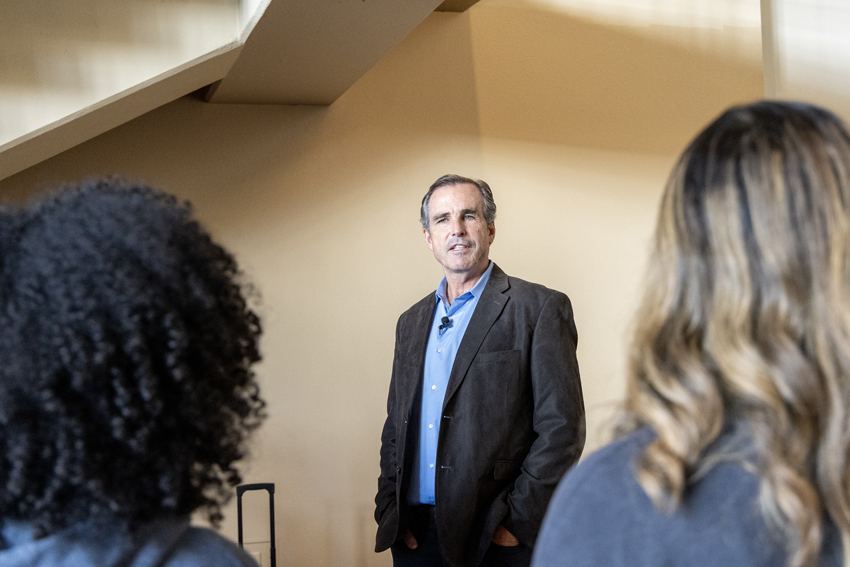
The flu season is never predictable. Viruses are always changing, which can make choosing the right vaccine a difficult choice for doctors. With the flu season rapidly approaching the United States, Americans all over the country anxiously wait for the arrival of the new vaccine. Flu season prevention has arrived.
It is best to receive the vaccine as soon as it comes out. Flu season in the U.S. most often occurs during the winter, and it reaches its highest point between December and February, so it is best to get vaccinated before then. It takes about two weeks for the vaccine to develop antibodies inside your body to help defend against illness.
Robin Boertje, nurse practitioner, recommends getting vaccinated right after the shot becomes available to the public.
“The earlier you get it the better, because it takes about two weeks after you get vaccinated for your body to recognize the vaccine and form antibodies to the virus,” Boertje said. “The sooner you get it, the better off you are because you get that protection earlier in the season. I know that right now they are already giving flu shots for this season, so the quicker you get it the better off you are.”
Oftentimes, Americans fail to realize the serious danger of contracting influenza. The flu poses a greater risk to children, the elderly and adults with compromised immune systems. If not treated quickly enough, the flu can become more than just a common illness. Influenza claims the lives of many Americans each year, something that most people refuse to believe. However, it is hard to know exactly how many people die of the influenza alone since many people who die with the flu suffer from other medical issues.
Most of the shots you get are not a live virus. Patients sometimes say that they got the flu shot and they got the flu from it, but that’s not true. You really can’t get the flu from the shot. It might be a coincidence that you got sick at the same time or you were already sick with the flu before your body became immune from the shot. — Robin Boertje, Nurse practitioner
The vaccine defends against viruses that researchers believe will be the most prevalent each year. Although they do not know which flu strain will be the most common, researchers usually choose the correct vaccine. The flu shot is composed of dead viruses, which contrary to common belief, will not make you sick with the flu.
Boertje explains why the flu shot vaccine will not make a person sick.
“Most of the shots you get are not a live virus,” Boertje said. “Patients sometimes say that they got the flu shot and they got the flu from it, but that’s not true. You really can’t get the flu from the shot. It might be a coincidence that you got sick at the same time or you were already sick with the flu before your body became immune from the shot.”
Although the flu shot will not give you the flu, it is possible that some people may experience reactions from the vaccine. Most of the time these side effects are just soreness and redness around the site of the injection. The vaccine is also available through nasal spray for those who feel uneasy around needles.
[fusion_soundcloud url=”https://api.soundcloud.com/tracks/227024176″ params=”auto_play=false&hide_related=false&show_comments=true&show_user=true&show_reposts=false&visual=true” width=”100%” height=”150″ iframe=”true” /]
Over the years the nasal spray has proven to be just as effective as the normal flu shot. Boertje shares her opinion about the nasal vaccine.
“The nasal vaccine is actually a live virus, most of the shots you get are not a live virus. The nasal shot is very effective. It might be even a little bit more effective because it is a true live virus and your body can recognize what it is exactly and be able to defend against it better,” Boertje said. “However (with the nasal vaccine) you are at risk for actually getting the virus since it is live, but most of the symptoms are less serious than if you were to not receive the vaccine.”
Even though most research shows that the flu vaccine helps prevent the flu, many students are still wary about getting the shot. Cate Vander Kooi, ’18, feels that getting the shot is not worth the time.

“I am not going to get the flu shot this year. I just find that it’s a waste of time,” Vander Kooi said. “I don’t have time to go and get it and sometimes I don’t even find myself getting the flu when I don’t get it. So to me, I just don’t feel like it’s worth it.”
However, other students are ready the vaccine. Karagin Udall, ’17, believes that it is best to get the vaccine so that she will not risk missing any school.
“I plan on getting the flu shot because I believe it will help prevent the flu,” Udall said. “You don’t want to get the flu and get sick and miss a bunch of fun stuff like school.”
The flu shot is available at numerous locations around the country. Most pharmacies offer the vaccine for free and with no appointment needed.
There are also many other steps that can help you protect yourself from the flu virus. Make sure to always wash your hands and get plenty of rest to avoid getting ill. If you do get the flu this year, make sure you stay at home to avoid spreading the flu to other people.
How much do you know about how germs are spread? Take this quiz to find out!
For more information on how to protect yourself from getting the flu, visit CDC.gov.
You can contact this author via twitter: @fikse24 or via email: Mariana Fikse.







